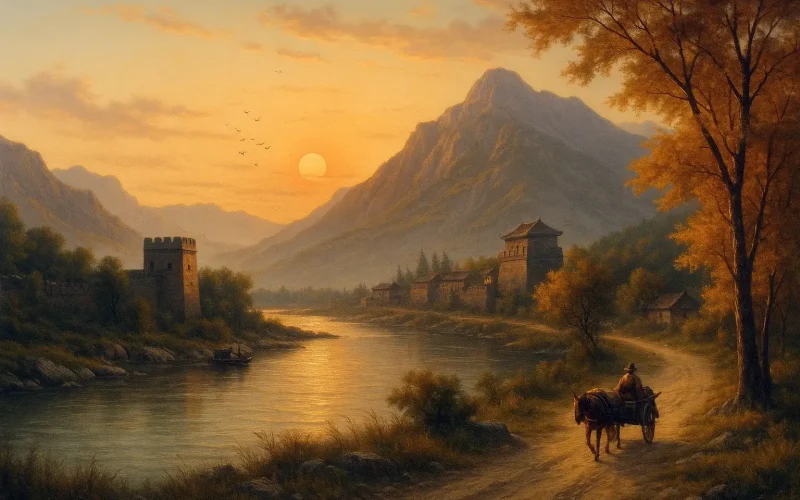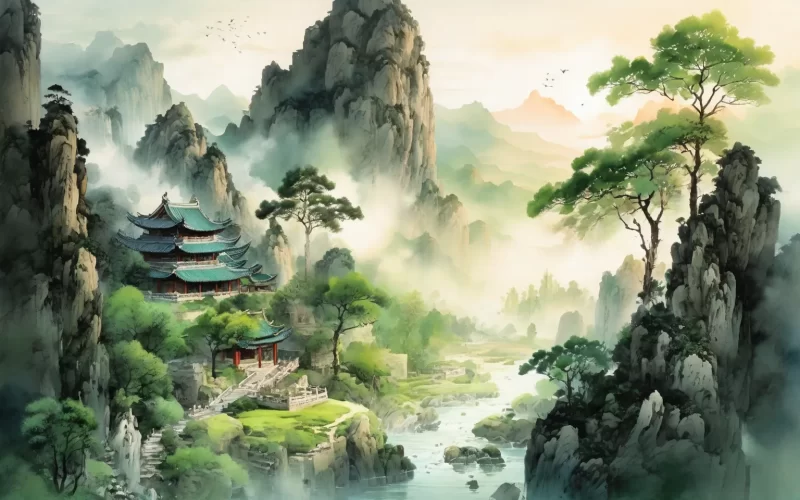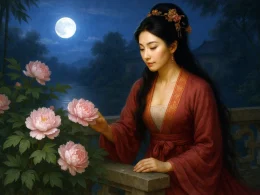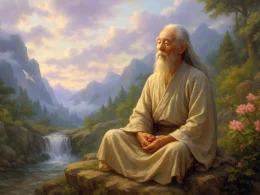The clear stream threads through woods now thin and sere,
Flowing as slowly as my cart draws near.
A kindly fellow-traveler it seems to be,
Homeward with evening birds across the lea.
A crumbling wall looks down on the old ferry;
Autumn sunset drowns the peaks in hues so merry.
…Now, far below the mighty Mount Song’s crest,
I’ll close my door and find long-needed rest.
Original Poem
「归嵩山作」
王维
清川带长薄,车马去闲闲。
流水如有意,暮禽相与还。
荒城临古渡,落日满秋山。
迢递嵩高下,归来且闭关。
Interpretation
This poem stands as a pivotal work from Wang Wei's middle period, marking a significant shift in both his life trajectory and his poetic realm. Composed in the autumn of 734 AD, following the end of his mourning period for his mother and his resignation from office to retreat to Mount Song, the poet uses the framework of a specific homeward journey to meticulously record a migration in the geography of the soul—from "holding office" to "withdrawing into seclusion," from "engagement with the world" to "disengagement from it." The poem's eight lines unfold like a landscape scroll where the brushwork progresses from serene openness to austere vigor, and the hues shift from lucid clarity to vast obscurity. Through the movement in space and the passage of time, it completely unveils the complex inner journey of a scholar-official shedding his social identity, returning to the authenticity of nature, and finally finding rest in his spiritual homeland.
First Couplet: 清川带长薄,车马去闲闲。
Qīng chuān dài cháng bó, chē mǎ qù xián xián.
Clear streams girdle the stretching plain;
My carriage moves with calm, at ease.
The opening establishes the poem's unhurried yet resolute tone. "Clear streams girdle the stretching plain" is a static, beautiful natural composition, metaphorically representing the purity and vitality the heart yearns for. "My carriage moves with calm, at ease" presents a dynamic, composed self. The phrase "with calm, at ease" does not denote indolence but a leisurely demeanor freed from utilitarian aims and temporal anxiety—the external manifestation of a spirit that has regained its autonomy. Carriages and horses, symbols of worldly toil, here "move with calm, at ease," hinting at the transformed nature of this journey: it is not a rush forward but a return; not advancement but withdrawal.
Second Couplet: 流水如有意,暮禽相与还。
Liú shuǐ rú yǒu yì, mù qín xiāng yǔ huán.
The flowing water seems to know my mind;
At dusk, birds wing homeward, close aligned.
This couplet, through personified nature, constructs a universe filled with warmth and resonance. "The flowing water seems to know my mind" is empathy, and more profoundly, a discovery of the harmony between nature's rhythms and the human heart—the water's course subtly aligns with the resolve to withdraw. "At dusk, birds wing homeward, close aligned" alludes to Tao Yuanming, explicitly highlighting the theme of "return." The birds flying home "close aligned" contrasts with the poet's solitude as a "lone returnee," yet it also offers comfort and affirmation from the natural order: all beings have their place of return, and so do I. Here, the poet forms a spiritual alliance with the flowing water and the dusk birds.
Third Couplet: 荒城临古渡,落日满秋山。
Huāng chéng lín gǔ dù, luò rì mǎn qiū shān.
A crumbling wall overlooks the ancient ferry;
The setting sun fills autumn hills, deep and dreary.
Midway, the scenery and mood shift abruptly, marking the poem's emotional turn and deepening. "A crumbling wall" and "the ancient ferry" are images of historical and civilized ruins, symbolizing the vanity and transience of the worldly glory the poet bids farewell to (or sees through). "The setting sun fills autumn hills, deep and dreary" places the personal journey of return within a cosmic temporal and spatial context with its immensely vast, warm yet solemn image. The word "fills" carries great tension, signifying both the pervasive saturation of light and the seeping diffusion of a desolate, lonely feeling. Autumn hills are inherently bleak; the setting sun adds boundless obscurity. The sublime beauty of this moment contains a profound lament for the fading of glory and life's approach towards dusk.
Fourth Couplet: 迢递嵩高下,归来且闭关。
Tiáo dì Sōng gāo xià, guī lái qiě bì guān.
After the long road, beneath Mount Song's high crest,
Returned, I'll close my door and live in rest.
The poem concludes with the geographical endpoint and the spiritual starting point. "After the long road" speaks to the distance traveled and metaphorically to the loftiness of aspiration and the difficulty of the return journey. "Beneath Mount Song's high crest" is the spatial arrival and, more importantly, a homecoming to a cultural symbol (Mount Song being a sacred site of the eremitic tradition). "Returned, I'll close my door and live in rest" is the ultimate declaration of action and stance in life. The phrase "close my door" is resolute and clear: it signifies not only physical reclusion but a closing and turning inward of the heart—shutting the door to external distractions and opening the journey of inward contemplation and self-cultivation. This "door" is not a wall of confinement but a barrier guarding a realm of clarity.
Holistic Appreciation
This is a "record of the soul's homecoming," tightly structured, with emotional shifts as natural as breath. The four couplets correspond precisely to four psychological stages of the return journey: the first presents the "serene departure" (with calm, at ease); the second, the "resonant journey" (seems to know, close aligned); the third, the "somber contemplation" (crumbling, ancient, setting sun, autumn); and the fourth, the "resolute settling" (returned, close my door). The emotion progresses from peaceful contentment, through desolate solemnity, finally returning to calm resolve, completing a process of full "purification" and "sublimation."
Wang Wei's profundity lies in not portraying withdrawal as a purely bright, triumphant escape. The desolate imagery of the "crumbling wall, ancient ferry" and "setting sun filling autumn hills" honestly exposes the inevitable loneliness and tragic awareness that accompany bidding farewell to the past and facing the unknown. It is precisely this honesty, this refusal to evade complexity, that makes the final "I'll close my door and live in rest" not a flippant escape, but a rational choice and an expression of life's courage arrived at after emotional upheaval and deep reflection. Withdrawal, here, becomes a lucid undertaking—to bear solitude, to bear silence, and to bear the full responsibility for one's own life.
Artistic Merits
- Sequence of Imagery as a Reflection of the Inner Journey: Clear streams, stretching plain (lucid vitality) → flowing water, dusk birds (warmth) → crumbling wall, ancient ferry, setting sun, autumn hills (desolation) → Mount Song's high crest, closing the door (loftiness, resolve). This carefully arranged sequence of imagery precisely corresponds to and externalizes the curve of the poet's inner emotional journey, exemplifying the principle that "all scenery speaks the language of feeling."
- Emotive Use of Verbs and Adjectives: "Girdle" (encircle), "moves with calm, at ease" (depart leisurely), "seems to know" (imbue with spirit), "close aligned" (intimate resonance), "overlooks" (desolate confrontation), "fills" (solemn permeation). These words, while describing the external world, are deeply saturated with the observer's emotional hues.
- Temporal and Spatial Tension within Parallelism: The second couplet parallels "flowing water" with "dusk birds" (natural elements), and "seems to know my mind" with "wing homeward, close aligned" (emotional states). The third couplet parallels "crumbling wall" with "setting sun" (decay and passing), and "overlooks the ancient ferry" with "fills autumn hills, deep and dreary" (specificity versus pervasiveness in space). Within the strict parallelism lies a sense of flowing time and expansive space, supporting the poem's grand structure.
- The Terse Concluding Line and Concentrated Force: "Returned, I'll close my door and live in rest" consists of only five characters in the original, with a terse syntax and decisive tone, forming a sharp contrast with the relatively relaxed rhythm of the preceding three couplets. This abrupt rhythmic shift strengthens the weight of the resolution and fixes the final stance, like metal striking stone, with a resonant echo.
Insights
This poem is a mirror of the soul traversing millennia, reflecting spirits of every era yearning for "return." It reveals that true "homecoming" is not necessarily a geographical migration but an inner cleansing, a re-evaluation of values, and a fundamental adjustment of life's rhythm. It requires the leisure of "my carriage moves with calm, at ease" to discern what is truly important (clear streams, stretching plain). It must endure the somber scrutiny akin to the "crumbling wall and setting sun" to comprehend the vanity and limitations of the past. Ultimately, it requires the courage of "I'll close my door and live in rest" to demarcate, within the clamorous world, a spiritual "Mount Song" for oneself and to cultivate depth of life therein.
In modern society, we may not, and need not, withdraw to mountain forests, yet we can still embody the spirit of "returned, I'll close my door and live in rest": amidst the flood of information, learn to let the spirit move "with calm, at ease"; in the pursuit of gain, listen to the true call of the heart, like the water that "seems to know my mind"; when encountering difficulties or weariness, find the courage to confront the desolation akin to the "setting sun filling autumn hills" and draw strength from it; and finally, at a certain moment, make one's own decision to "close the door"—to set boundaries, focus inward, and safeguard that most authentic peace and creativity. This, perhaps, is the most enduring gift Wang Wei's journey back to Mount Song bequeaths to all modern wayfarers.
Poem translator
Kiang Kanghu
About the poet

Wang Wei (王维), 701 - 761 A.D., was a native of Yuncheng, Shanxi Province. Wang Wei was a poet of landscape and idylls. His poems of landscape and idylls, with far-reaching images and mysterious meanings, were widely loved by readers in later generations, but Wang Wei never really became a man of landscape and idylls.












